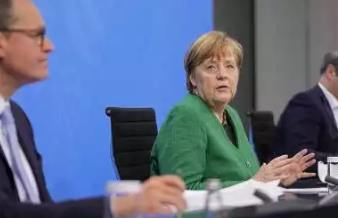
Germany is extending the current lockdown through to April 18, Chancellor Angela Merkel announced on Tuesday.
The country will enter an even stricter lockdown from April 1 to April 5, over the Easter holiday period when shops, including grocery stores, will largely have to close.
Merkel warned that Germany needed to “break the exponential growth of the third wave.” Case numbers have reached levels that authorities say will overburden intensive care units.
Tuesday’s announcement marks a reversal from earlier this month when state leaders agreed to begin a cautious reopening process.
Talks between leaders of Germany’s 16 federal states and Merkel lasted until the early hours of the morning following a lengthy interruption.
What are the new measures?
As well as prolonging existing measures such as the closure of cultural, leisure and sporting facilities, tougher restrictions will apply over the Easter period.
- Churches will be asked to hold services marking the Christian festival online.
- No more than five adults from two households will be able to meet over the five-day period.
- Testing and vaccination centers can remain open.
- Public gatherings will be prohibited.
- Almost all shops will be shut during the five days. Only grocery stores may open on Saturday, April 3.
- Anyone from Germany holidaying abroad will have to be tested before boarding a flight back to Germany.
The “emergency brake” will halt further reopenings and will apply to areas exceeding 100 new cases per 100,000 inhabitants over a seven-day period.
If an area has an incidence rate of over 100 for three consecutive days, harsher lockdown measures will once again apply.
What did Merkel say?
“We are in a very, very serious situation” due to the spread of coronavirus variants in the country, Merkel told the press conference.
“What we have is essentially a new pandemic,” she said. The new virus is “significantly more deadly, significantly more infectious.”
“It really makes you a bit wistful about what we could have already achieved,” Merkel said.
She added that the mutated virus has now “basically eaten up” earlier gains.
Germany would have to be “prudent and flexibile” and was in a “race against time” to vaccinate its population.
What state leaders said
“We are having a de facto Easter lockdown,” Bavarian State Premier Markus Söder told reporters. The goal is to take the speed out of the virus, he said.
“We are probably now living in the most dangerous phase of the pandemic,” Söder added, saying that many people underestimate the situation.
He cautioned that impatience should not become Germany’s weakness.
Governing Mayor of Berlin Michael Müller said it was important to win time until the vaccine becomes available.
Tuesday’s decision represented a “paradigm shift” on how to proceed in the pandemic, he said. “It is no longer just about restrictions, it is no longer just about ‘open — close, open — close.'”
Stephan Weil, Lower Saxony’s state premier, backed the measures as he spoke of “five days of hard lockdown over Easter.”
“Firms should not produce anything, traveling to work should only take place when it is absolutely necessary. Public life in Germany and human interactions should be reduced to the absolute minimum. A short but consequent phase of stillstand can break and dampen the infection wave,” Weil said.
A full lockdown ‘won’t work’
Professor Andrew Ullmann, spokesman for the German parliament’s health committee told DW he believes that a full lockdown, such as that enforced in early 2020 during the first wave, “won’t work” due to general lockdown fatigue in the population.
“What I’m really concerned about is that we are running from one lockdown to the next lockdown with any with no perspective for our population,” added Ullman, who is also a trained physician and lawmaker for Germany’s pro-business Free Democratic Party.
Infection rate quickly rising
According to Germany’s Robert Koch Institute for infectious diseases (RKI), the seven-day incidence rate stood at 107 on Monday, above the 100 threshold at which hospitals often become overwhelmed.
Health authorities warned last week that coronavirus case numbers are rising at a “very clearly exponential rate.”
The number of confirmed cases in Germany on Monday increased by 7,709 to 2,667,225, while the death toll rose by 50 to 74,714.
*story by DW


